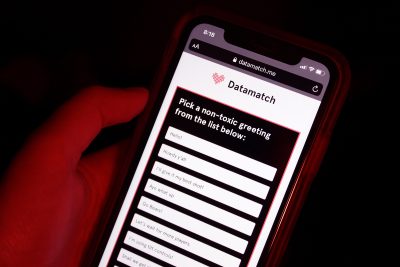People worldwide herald Valentine’s Day as a day to be spent with the people you love. But how does this meaning change with social distancing?

Members of the Boston University community divulged their pandemic-safe dates with their significant others, as well as new ways they are meeting people virtually.
Regina Acosta, a junior in the College of Arts and Sciences, said she stayed home in Texas this semester.
Acosta, who said she is in a relatively new relationship, said she was in quarantine for the holiday, but did not let it ruin her first Valentine’s Day celebration with her new boyfriend.
She said she planned to bake vanilla cupcakes — decorated in festive sprinkles — to give to her valentine. The couple also planned a socially distanced brunch together and a “Newlywed Game” to get to know each other better.
“It’s really basic,” Acosta said, “but you kind of just try to maintain a sense of normalcy, while taking into account the situation.”
When it comes to dates and Valentines, she said making “basic” moments special — while still adhering to safety guidelines — is key.
“We go on a lot of coffee dates,” she said. “It’s just taking care of those little moments while trying to still be safe.”
On campus, Giuliana Calia, a senior in the College of Arts and Sciences, and her boyfriend planned a virtual coffee tasting through the coffee-subscription company Driftaway Coffee to celebrate, she said.
The company hosts tastings on Saturdays through Instagram Live — when a coffee expert walks viewers through four different coffee samples — and customers order a tasting kit to be sent to their house beforehand to drink along while watching.
“He’s a huge fan of coffee,” Calia said of her boyfriend. “I thought it was a fun, unique thing, and is COVID-friendly.”
A take-out lunch and bike ride completed the date, she said.
Though planning a date during a global pandemic can pose its challenges, finding a date with a complete stranger presents an even greater difficulty.
For the first time at BU, Datamatch is helping students find 10 possible friends or dates.
Datamatch is a matchmaking survey run by students that was initially started in 1994 at Harvard University. More than 700 students at BU filled out the questionnaire, and Datamatch results were revealed Valentine’s Day for students.
CAS senior Alara Orscelik is one of the students who worked to bring Datamatch to BU this semester. She noted some of the pros of using Datamatch as opposed to a mainstream dating app.
“If you don’t want to reach out to that [matched] person, you don’t need to,” Orscelik said. “You can also become friends, which I think takes the pressure off from other dating apps, either Tinder or Bumble.”
Datamatch users answered BU-centric questions such as “What dining hall are you?” or “Opinions on the BU beach?” to match users.
The answers are then run through the Harvard-designed algorithm to produce matches delivered to users on Valentine’s Day.
Although this is the first year Datamatch has been active on BU’s campus, Orscelik said she hopes it will not be the last.
In whatever capacity students choose to meet up, Orscelik said safety should be a priority.
“That’s what we’re trying to promote as much as possible,” she said.
Sam Thomas, a freshman in CAS, said he took Datamatch’s survey and, despite the limitations imposed by the pandemic, thought the BU-specific questions were lighthearted and unique.
“I think it worked well with trying to keep things virtual this year,” he said. “It was a really creative and fun way to do it.”
For the 14th, Thomas said he talked to his family while his floormates taped Valentines on everyone’s door — a lowkey Valentine’s Day, he said.
Given that he couldn’t go out to celebrate, Thomas said having Datamatch “made it easier” to meet new people safely. But as a gay man, he said he thought the service pushed heteronormativity, based on his experience.
“I don’t know if it was just the type of people who signed up, but I didn’t really see a lot of gay people on it,” Thomas said. “It was mostly straight people or just people looking for friends.”
Though Valentine’s Day often focuses on heterosexual couples, Thomas said he think that norm is shifting — for the better.
“Just from commercials and advertisements and stuff, [Valentine’s Day] does seem like it’s more geared toward traditional, straight couples,” he said. “But I think, in recent years, they are getting better with aiming at all types of love.”
Rachel Do contributed to the reporting of this article.
















































































































